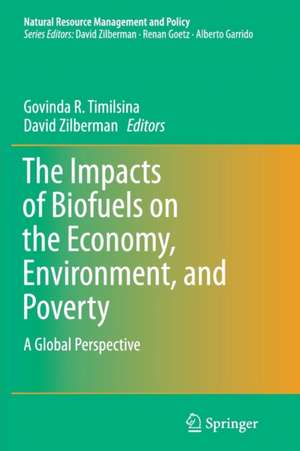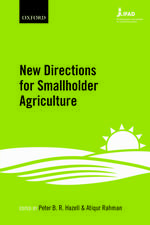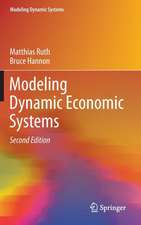The Impacts of Biofuels on the Economy, Environment, and Poverty: A Global Perspective: Natural Resource Management and Policy, cartea 41
Editat de Govinda R. Timilsina, David Zilbermanen Limba Engleză Paperback – 23 aug 2016
| Toate formatele și edițiile | Preț | Express |
|---|---|---|
| Paperback (1) | 634.00 lei 6-8 săpt. | |
| Springer – 23 aug 2016 | 634.00 lei 6-8 săpt. | |
| Hardback (1) | 640.06 lei 6-8 săpt. | |
| Springer – 21 mai 2014 | 640.06 lei 6-8 săpt. |
Din seria Natural Resource Management and Policy
- 18%
 Preț: 1226.24 lei
Preț: 1226.24 lei - 18%
 Preț: 958.56 lei
Preț: 958.56 lei - 18%
 Preț: 958.38 lei
Preț: 958.38 lei - 18%
 Preț: 1223.74 lei
Preț: 1223.74 lei - 18%
 Preț: 948.29 lei
Preț: 948.29 lei - 15%
 Preț: 641.03 lei
Preț: 641.03 lei - 18%
 Preț: 954.93 lei
Preț: 954.93 lei - 15%
 Preț: 646.43 lei
Preț: 646.43 lei - 18%
 Preț: 955.08 lei
Preț: 955.08 lei - 18%
 Preț: 1233.37 lei
Preț: 1233.37 lei - 15%
 Preț: 651.84 lei
Preț: 651.84 lei - 18%
 Preț: 951.47 lei
Preț: 951.47 lei - 18%
 Preț: 1229.73 lei
Preț: 1229.73 lei - 18%
 Preț: 1229.28 lei
Preț: 1229.28 lei - 15%
 Preț: 643.00 lei
Preț: 643.00 lei - 18%
 Preț: 1237.14 lei
Preț: 1237.14 lei - 15%
 Preț: 645.79 lei
Preț: 645.79 lei - 15%
 Preț: 650.86 lei
Preț: 650.86 lei - 15%
 Preț: 653.14 lei
Preț: 653.14 lei - 18%
 Preț: 1233.52 lei
Preț: 1233.52 lei - 18%
 Preț: 1233.20 lei
Preț: 1233.20 lei - 18%
 Preț: 950.96 lei
Preț: 950.96 lei - 18%
 Preț: 1242.21 lei
Preț: 1242.21 lei - 18%
 Preț: 1222.01 lei
Preț: 1222.01 lei - 18%
 Preț: 951.29 lei
Preț: 951.29 lei - 18%
 Preț: 1551.11 lei
Preț: 1551.11 lei
Preț: 634.00 lei
Preț vechi: 745.88 lei
-15% Nou
Puncte Express: 951
Preț estimativ în valută:
121.32€ • 129.73$ • 101.15£
121.32€ • 129.73$ • 101.15£
Carte tipărită la comandă
Livrare economică 17 aprilie-01 mai
Preluare comenzi: 021 569.72.76
Specificații
ISBN-13: 9781493955176
ISBN-10: 1493955179
Pagini: 164
Ilustrații: XVIII, 144 p. 58 illus., 51 illus. in color.
Dimensiuni: 155 x 235 x 9 mm
Greutate: 0.24 kg
Ediția:Softcover reprint of the original 1st ed. 2014
Editura: Springer
Colecția Springer
Seria Natural Resource Management and Policy
Locul publicării:New York, NY, United States
ISBN-10: 1493955179
Pagini: 164
Ilustrații: XVIII, 144 p. 58 illus., 51 illus. in color.
Dimensiuni: 155 x 235 x 9 mm
Greutate: 0.24 kg
Ediția:Softcover reprint of the original 1st ed. 2014
Editura: Springer
Colecția Springer
Seria Natural Resource Management and Policy
Locul publicării:New York, NY, United States
Cuprins
Biofuels: An Introduction of Market and Impacts.- Technologies, Production Costs, and Support Policies.- Biofuels and Global Food Crisis.-Impact on Land.- Biofuels and Poverty.- Oil Price and Biofuels.- Biofuels and Climate Change Mitigation.- Policies for Biofuels: Direct Subsidies to Biofuels vs. Carbon Tax to Fossil Fuels.- Political Economy of Biofuels.
Textul de pe ultima copertă
Interest in biofuels began with oil shocks in the 1970’s, but the more rapid development and consumption of biofuel industry in recent years has been primarily driven by mandates, subsidies, climate change concerns, emissions targets and energy security. From 2004 to 2006, fuel ethanol grew by 26% and biodiesel grew by 172%. As biofuel production continues to expand, investments in capacity expansion and research and development have been made. The 2008 food crisis emphasized the need to re-examine biofuel consequences. Biofuels remain an important renewable energy resource to substitute for fossil fuels, particularly in the transportation sector, yet biofuels’ success is still uncertain. The future of biofuels in the energy supply mix relies on mitigating potential and improving the environmental gains. This book brings together leading authorities on biofuel from the World Bank to examine all of the impacts of biofuel (economic, social, environmental) within a unified framework and in a global perspective, making it of interest to academics in agricultural and environmental economics as well as industry and policy-makers.
Caracteristici
Investigates various countries and their alternative fuel initiatives Analyses the environmental, economic and political ramifications of alternative fuel research and development Explores the issues of trade security, oil price volatility, climate change, greenhouse gas (GHG) mitigation and production costs associated with the development of alternative fuels















